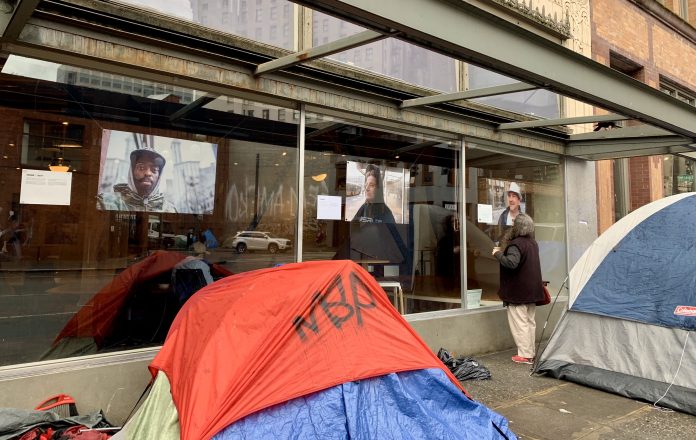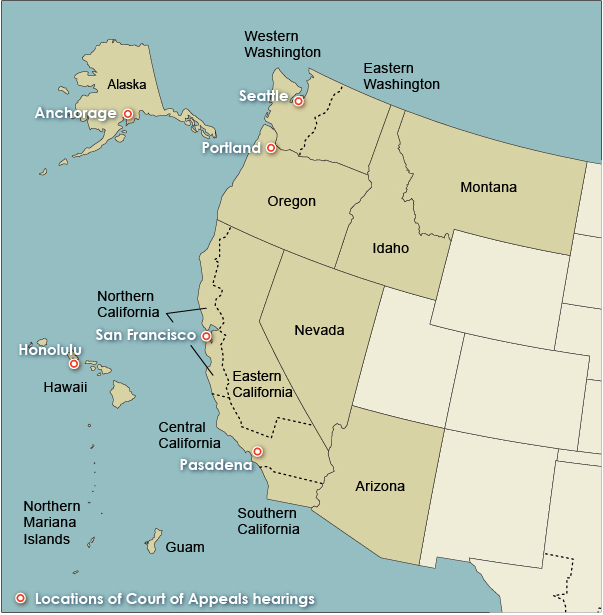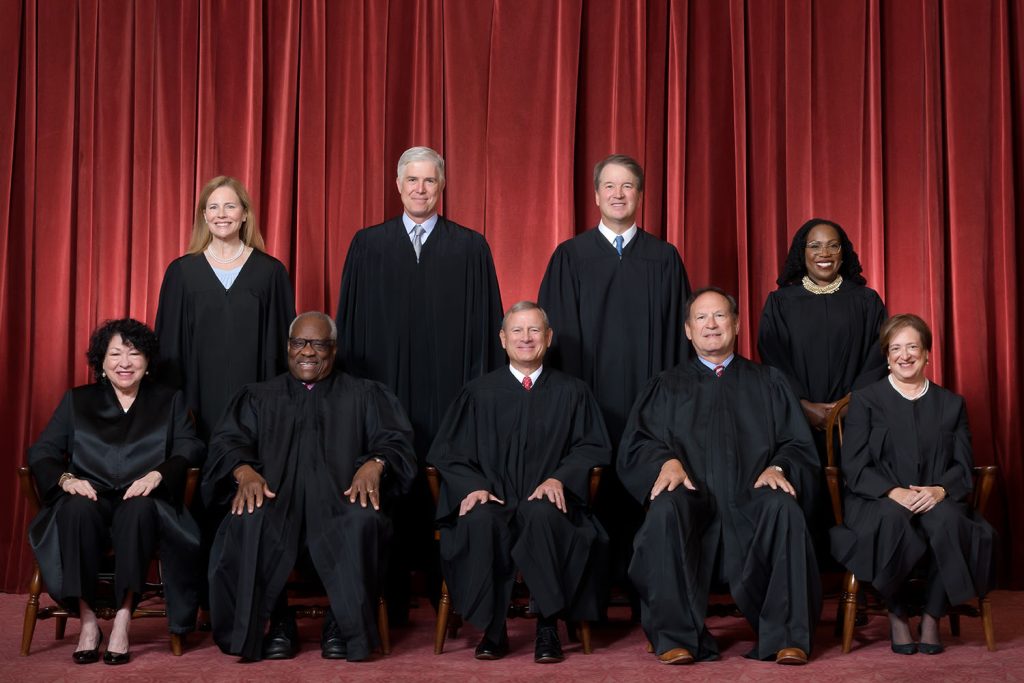
Seattle and other West Coast cities are pushing for the right to clear encampments without offering shelter.
On April 22, the U.S. Supreme Court heard oral argument on Grants Pass v. Johnson, an appeal to a Ninth Circuit case of the same name. The case centers on the “difficult policy question” that has haunted West Coast cities and state governments for years: how do we address the homelessness crisis?
The City of Grants Pass, Oregon, passed two ordinances that prohibited “camping” on public property and camping in a car. “Camping” in the ordinance broadly defined to include remaining in a place where material used for bedding is placed to maintain a temporary place to live. The Grants Pass City Council President Lily Morgan in 2013 argued “mak[ing] it uncomfortable enough for [homeless people] in our city so they will want to move on down the road.”
The shelter that is within the city limits amounts to fewer than 100 beds, with most run by a nonprofit called Grants Pass Gospel Rescue Mission, housing 78 beds for men. Josephine County estimated that the homeless population in Grants Pass is approximately 600, based on the most recent point-in-time counts. One of the homeless petitioners, Debra Blake, died during litigation in 2021.
Several cities across the ostensibly liberal West Coast have joined Grants Pass in its fight – the erstwhile progressive bastion of Seattle doing just the same. Seattle City Attorney Ann Davison filed an amicus brief requesting that the Supreme Court overturn the Ninth Circuit’s ruling local governments should not be compelled “to choose between providing shelter or surrendering public lands to encampments that harm local communities.” California Governor Gavin Newsom echoed Davison’s brief, stating in late 2023, “I hope this goes to the Supreme Court… It’s gone too far. People’s lives are at risk.”
The Ninth Circuit ruling only applies to the states within its jurisdiction, including California, Oregon, Washington, Hawaii, Alaska, Montana, Idaho, Nevada, and Arizona. However, a U.S. Supreme Court decision could have more far-reaching impacts by establishing new legal precedents.

“The Supreme Court’s decision to hear the Grants Pass v. Johnson case is a pivotal one that will shape how cities address homelessness for generations to come,” Sarae Lewis, principal of communications and campaigns at Community Solutions, said in a statement. Much like Community Solutions, several nonprofits, homeless advocates, and organizations have sided with the homeless petitioners in the case.
The American Institute of Architect’s Committee on Homelessness released a letter directed at Davison, Mayor Bruce Harrell, and Seattle City Councilmembers on the issue. “The City of Seattle should allow individuals to take shelter on public land when no alternative living arrangements can be made available to them. Studies show that encampment sweeps are counterproductive, costly, and harmful, and only cause more harm to those living outside and our communities,” the signed statement said. Their letter concluded, “We implore the City to adopt a comprehensive plan, policies, and regulations to increase availability of all types of housing.”
Much of the oral argument at the Supreme Court was consumed by discussion of “status” of a person defined under Robinson v. California and whether homelessness constituted a person’s status. The 1962 decision regarded a California law that explicitly criminalized the status of addiction. The Supreme Court at the time ruled that it was unconstitutional for a state to punish a defendant for drug addiction, which is a status rather than an act, when the defendant has not engaged in any illegal conduct with drugs. The status of the homeless individual in question is key to the case, and was an implied question raised by multiple justices.

The case interweaves several fundamentally connected problems: the overburden on cities dealing with the homelessness crisis, homeless people themselves and ensuring they get the care they need, public health, housing supply, housing cost, cost of living, cost of building, criminal justice, the Eighth Amendment’s broad definition of “cruel and unusual punishment,” how the Supreme Court historically hollowed out the meaning of what constitutes “cruel and unusual,” and so on. To top it off, a court decision that could make life worse for some of society’s most vulnerable residents.
Despite the “difficult policy question” rhetoric reiterated time and time again by the justices during oral argument, there was sympathy for Grants Pass and the ordinances it deployed by the conservative justices. Justices Brett Kavanaugh and Amy Coney Barrett at times broke with their colleagues, asking pointed questions of the City’s counsel.
One of the primary questions raised was whether the individuals who would be unable to have a bed were supposed to find shelter in another jurisdiction. Justice Kavanaugh questioned the logic of jailing someone for repeated citations when there were no options available to begin with.
“When you get out of jail if you end up — what’s going to happen then? Aren’t — you still don’t have a bed available. So how does this help?” Justice Kavanaugh asked, and then subsequently answered the question for Grants Pass’s counsel. “… You get out, I mean, you’re not going to be any better off than you were before in finding a bed if there aren’t — going to my earlier question, if there aren’t beds available in the jurisdiction, unless you’re removed from the jurisdiction or you decide to — to leave somehow.”
In relation to drug treatment and services, Justice Barrett followed up asking Grants Pass’s counsel whether treatment is available. “… [T]here’s treatment available, so people would ultimately move off the street? … I think part of the premise of all of this, right, is that there are not enough beds for homeless people to occupy, and so there will be a mismatch and there are going to be some people who can’t be cared for. Are you saying that if your law is enforced, there is a way for everyone to be cared for?”
“The same way we see insufficient resources to address homelessness in the country, people struggle to gain access to substance use services and mental health services,” the Urban Institute’s Samantha Batko told The Urbanist. “The answer [to Justice Barrett’s question] is no, there isn’t [treatment on the other side of an arrest]. Arresting people and citing people because they’re experiencing a substance use disorder or a mental health disorder while experiencing homelessness isn’t going to resolve this issue.”
The Justices’ reasoning puts into perspective the cruelty represented in the amicus brief submitted by the City of Seattle in which solutions are not offered other than to sweep and dump homeless people elsewhere, possibly into another jurisdiction. The amicus implies that homelessness is a moral failing of the homeless individuals and not the city’s problem. In fact, it might be another jurisdiction’s problem altogether. The Grants Pass ordinance effectively criminalizes homelessness without criminalizing homelessness, as the only people affected by a ban on sleeping outside would be the homeless – people with no other option.
The principle argued against by Seattle and the City of Grants Pass is the same one the Ninth Circuit held in the 2018 decision Martin v. Boise. There, the Ninth Circuit expanded the interpretation of the Eighth Amendment’s Cruel and Unusual Punishment Clause to include prohibiting punishment of homeless individuals when no other option was available. While banning camping is still applicable, as is the case in Tacoma, there must be shelters or alternatives made available for the homeless people in question.
This is not a burden to cities, but rather a duty imposed on them and their states to invest in the resources necessary to provide for the population. Counter to the claims made by Governor Newsom and Seattle city officials, the removal of this imposed duty on West Coast cities and states creates the circumstance to not resolve the homeless crisis, but to ignore it. The legal dispute itself would not be litigated if they only built adequate housing or shelter.
“Homelessness is a result of systemic issues such as a lack of affordable housing, exorbitant rents, and a shortage of well-paying jobs,” Community Solutions’ Sarae Lewis continued in her statement. “Arresting and fining people for sleeping on the streets is ineffective, keeps people homeless for longer, and distracts from real solutions like those we see working in communities across the country.”
“We know housing is the solution to homelessness,” Batko explained. “We know citations do not solve homelessness… In fact, being arrested, receiving citations, or, stepping beyond the pertinent portions of the case, being part of an encampment sweep… those activities are not effective at ending homelessness, and sometimes even prolong it.”
On a single night in 2023, at least 600,000 people were classified as homeless, according to a report by the U.S. Department of Housing and Urban Development. Given its high housing costs and cost of living, the West Coast in particular has been hit hard by this crisis, and there are several groups and legislators who are centering homelessness as a top policy priority looking at not only temporary services but long-term supportive housing.
However, contrary to what the appellants have claimed, solutions to solve homelessness rather than push it somewhere else exist. A Way Home Washington released a landscape report on unaccompanied youth and young adult homelessness in Washington that showed that properly funded and targeted programs and supports made progress on decreasing rates of homelessness. Between 2016 and 2022, the rate of youth and young adults experiencing unaccompanied homelessness dropped 40% – from 23,961 young people in 2016, to 14,410 in 2022. This is not to discount the suffering and continued problem that persists – permanent housing for the homeless is needed – but it shows that there are solutions out there if cities adequately fund and pursue them.
“Cities that are struggling with homelessness, if they want to end homelessness, should be attending to housing as the solution,” Batko said. “The development of those solutions takes time. Local elected officials are faced with pressure from people in the housing community who want homelessness to be solved quickly. Housing and shelter are not always fast solutions. I think there is some local pressure to resolve something quickly, though not permanently.”
There are two possible outcomes from the Grants Pass case: a limited decision that overturns but maintains homelessness as a status that cannot be de jure criminalized (upholding Robinson), or it does not consider homelessness as a status and cities are allowed to take prohibitive measures as Grants Pass did (barring overriding state legislation). Given some of the justices’ skepticism of the Grants Pass law, there might be some hope for a narrow ruling. Conversely, given the Court’s history, it is unlikely to make homeless individuals’ lives easier.
“This case is not about clearing encampments, a harmful practice that many states already enforce and has only made homelessness worse. The case is about whether people can be arrested or fined for using blankets or pillows when they have nowhere else to go,” Community Solutions’ Policy and Advocacy Operations Manager Rachelle A. Matthews said in a statement to The Urbanist. “Arresting or ticketing our neighbors who have no choice but to sleep outside pushes them further into poverty and makes it harder to secure work and housing.”
The conservative supermajority Supreme Court is expected to hand down their decision in June.

Collin Thrower
Collin Rhys Thrower has long had an interest in policy issues that affect lives – whether it is healthcare, welfare, civil rights, or democracy itself. He sees politics as a puzzle, trying to solve systemic problems that have the chance to either do great good in the world or enact great harm. Born and raised in San José, California, Collin has a thirst for knowledge, learning, and growing in new spaces. Residing in Tacoma, Collin has a Master's in Political Science from Northeastern University.
